Need personalized assistance? Your solution starts here!


When you are reading this article, let’s assume you are from a medical background or you are an aspiring MBBS student. Hopping you may come across the term FMGE (Foreign Medical Graduate Examination) It is an examination for medical students who passed their MBBS/MD from foreign countries for candidates who chose MBBS abroad.
In a nutshell, FMGE (Foreign Medical Graduate Examination) allows medical graduates to start their medical career in India or any other country that conducts this examination. After passing this exam, students are awarded a license to practice in India or that particular country. If you still think you have very little info about this exam, you can browse our other blogs for know.
Coming to the main point recorded passing percentage of FMGE to date. The FMGE i.e. Foreign Medical Graduate Examination Dec 2022, which was conducted by the National Board of Examinations on the 12th of January 2023, announced the result on the 3rd of February 2023.
The passing percentage was 39.6%, which was truly an amazing thing that happened this year. It is no doubt outstanding results that rose high compared to the last few years. Unfortunately, the passing percentage of the FMGE (Foreign Medical Graduate Examination) has always been low, sometimes between 10 to 20%, which was not outstanding for sure. Furthermore, this year witnessed a maximum passing percentage and a large number of students qualified for the examination.
The high passing percentage has also been reasoned with the supposed uncertainty as well as fear of the NExT Exam i.e. National Exit Test which is scheduled to be introduced in the next academic year. Needless to say, the majority of students who sat for this exam know the FMGE pattern then NExT. They seem to have worked hard. Thus, we gave an outstanding result this time!
Let’s see the FMGE Session and Passing Percentage in detail.
|
FMGE SESSION |
PASSING PERCENTAGE |
|---|---|
|
2014 |
4.93% JUNE 20% DECEMBER |
|
2015 |
10.40% JUNE 12.2% DECEMBER |
|
2016 |
11.22% JUNE 8.08% DECEMBER |
|
2017 |
7.41% JUNE 13.89% DECEMBER |
|
2018 |
10.2% DECEMBER |
|
2019 |
20.7% JUNE |
|
2020 |
9.94% DECEMBER |
|
2021 |
23.91% DECEMBER |
|
2022 |
10.61% JUNE 39.6% DECEMBER |
A reputed daily stated with a general conversation of Union Health Ministry that this is an examination medical students have worked hard, therefore, the difficulty index might also have been slightly lower this DECEMBER 2022 exam.
FMGE (Foreign Medical Graduate Examination) is no doubt a tough exam in the country, and students show truly super results. In the end, it can be said, that it does not matter what the reason behind this excellent result in the passing percentage of the medical licensing exam in the country. It certainly seems promising, and at the same time assuring all Indian medical students who completed MBBS from foreign countries prepare their turn to excel in the FMGE (Foreign Medical Graduate Examination) or NExT (National Exit Test).
Also Read: FMGE Passing Percentage of Top Countries for MBBS

Overseas graduates will be expected to pass the new National Exit Test (NExT) instead of the Foreign Medical Graduate Exam beginning at an undetermined date (FMGE). Applicants who want to practice in India must pass NExT within two years of finishing their medical education overseas.
The National Exit Test is now both the licentiate test and the national medical postgraduate exam that students/MBBS hopefuls must pass to receive a "Doctor" tag next to their name. The central government of India included the test in the National Medical Commission Bill 2019. The NEXT test will be established and rolled out in 2023 and will serve as a substitute for both the FMGE Exam and the NEET-PG Exam.
According to the presented by the National Medical Commission (NMC), all medical graduates who finished their MBBS abroad must also pass the National Exit Test within two years of their MBBS. This is because, as previously stated, it will replace the FMGE test, which was formerly the licentiate exam for practicing in India. Candidates must pass the NEXT test to be registered for medical practice in India. PG admission in Indian medical institutes will be solicited and determined based on the results of the Upcoming medical test. The NEET-PG exam, which is meant to assess the abilities and knowledge of final-year medical students, is also likely to be changed.
The new medical bill's goal is to provide a single-window exit test for final-year medical students. After the new legislation is in effect, there will only be one test for a final year degree, medical practice license, and medical PG admittance.
|
Full Name of Exam |
National Exit Test (NExT) |
|
Taking effect in |
2023 |
|
Conducting body |
National Board of Examination (Expected) |
|
Aim of exam |
|
|
Exam Mode |
Offline |
|
Question Type Exam paper |
|
Related Tags

If you pursue any of these careers in 2023, you will have the highest chance of being employed. As the world changes at a quick pace, introducing new possibilities and sectors, so are our employment alternatives. Students are no longer confined to conventional vocations like engineering and medicine, but may also study and pursue a wide variety of fascinating and inspirational careers.
The medical sector, notably MBBS, is expected to flourish in 2023. The MBBS degree is one of the most sought-after and recognized in the world of healthcare, and it is an excellent option for people who wish to make a difference in the lives of others.
MBBS graduates may look forward to a variety of fascinating job opportunities. They may pursue careers in medical research, education, public health, or even clinical practice. In each of these areas, MBBS professionals may have a significant influence and contribute to enhancing patients' quality of life.
MBBS professionals may pursue other fascinating and inspirational jobs, such as medical journalism, publishing medical publications, or working as medical consultants in the corporate sector, in addition to being highly sought-after in the medical area. These are all excellent possibilities for folks who wish to go out while still using their medical knowledge and expertise.
MBBS graduates may also look forward to a promising career in artificial intelligence (AI). Artificial intelligence (AI) is becoming an increasingly significant aspect of the medical industry, and MBBS professionals may use their knowledge and abilities to create and work on cutting-edge AI technology. This is a very intriguing area with the potential to change the way we practice medicine.
Nurse Practitioner is the second most common profession.
It's hardly surprising that this "hero career" has remained at the top for 2023. You may expect to earn about $111,680 per year and be recognized as someone who saves lives. Advanced practice registered nurses (APRNs) include Nurse Practitioners, Nurse Anesthetists, and Nurse-Midwives. They coordinate patient care and may offer general care as well as special treatment. Nurse Practitioners, Nurse Anesthetists, and Nurse-Midwives are all examples of advanced practice registered nurses, or APRNs. They may offer general and even specialty healthcare as well as coordinate patient care.
The third most popular profession is that of a Health Specialty Teacher.
If you love teaching adults, this might be a good profession for you. A postsecondary education and health specialties teacher's annual salary is $102,720. Colleges and universities employ the vast majority of health specialty instructors. Others, however, work in medical facilities, trade schools, or junior colleges. Further licensing and certifications may be necessary depending on the field in which you teach.
The fourth-highest-paying job is that of a Medical and Health Services Manager.
You might consider a career as a Medical and Health Services Manager if you enjoy the pay and security of medical professions but would prefer to sit at a desk in a setting with healthy people. At the desk, your daily tasks will be to organize, lead, and manage the business activities of healthcare providers.
You will be assisting medical professionals in managing the business part of their practice and keeping them organized if you do so. True, you'll be busy pushing paperwork and talking with physicians at the medical office, but not too busy to go to the bank and cash your huge wage check of about $100,980 every year!
Related Tags
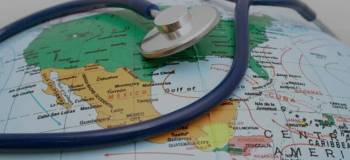
Aware of unforeseen circumstances in the world, the National Health Commission has now allowed Foreign Medical Graduates (FMGs) who have not completed their internships due to “limited circumstances” such as: War and Covid-19 to register for internships in India if they are able to pass the Foreign Medical Graduate Examination (FMGE). The National Health Commission has also issued guidelines for the registration of foreign medical graduates. Aware of unforeseen circumstances in the world, the National Health Commission has now allowed Foreign Medical Graduates (FMGs) who have not completed their internships due to “limited circumstances” such as: War and Covid-19 to register for internships in India if they are able to pass the FMGE. The National Health Commission has also issued guidelines for the registration of foreign medical graduates.
Yes, of course, there are a lot of questions regarding the concerned decision of NMC. Well, let's dig up a bit, The National Health Commission (NMC) has relaxed the standards for one year, allowing foreign medical graduates who have passed a drug test to intern at non-teaching hospitals. Internships at 679 designated hospitals across the states will be allowed through May next year. The easing was announced as some students - especially those who completed training in China and Ukraine last year - had to complete a two-year internship to fill a gap in the process. The actual learning process has been hampered by pandemics and wars.
The National Health Commission made it clear on Wednesday that accredited non-university hospitals will be allowed to do internships for foreign medical graduates until May 2024.
This is going to be a reasonable step from the side of NMC, and this is a good approach towards helping the other students.
“This relaxation is granted only as one-time measure. The allotment of FMGs in these non-teaching hospitals shall also be done through concerned state medical councils,” said the circular.
“In addition to the above, it has also been observed that there are also foreign medical graduates who have not completed their internship due to a compelling situation beyond their control, such as the COVID-19 pandemic. -19 and war, and so on."
As per the official notification, "Given the pain and stress faced by these foreign medical graduates, their application to complete the remainder of their internship in India is considered an eligible:
“Accordingly, the state medical board can deal with the same issue provided that the applicant obtains an FMGE licence before applying to complete the internship in India,” the announcement added.
Considering all relevant NMC regulations and circumstances, the committee has issued a set of guidelines for FMG registration by the State Health Board, as noted.
A medical degree or GMF degree must be registered to practise medicine in the country where it is issued and must be equivalent to a licence to practise medicine issued to citizens of that country.
If completed at a foreign institution, documentary proof of successful completion of physical training or internship in the course of medical certification equivalent to MBBS.
A copy of passport with VISA details from immigration.
Candidates who wish to apply to India must pass the FMGE conducted by the National Examination Board (NBE).
The State Board of Health may enrol applicants who meet the above criteria for a 12-month period or a balanced period, if applicable.
Internships will be authorised at hospitals of the medical faculty or at hospitals affiliated with the medical faculty, as authorised by the committee.
The maximum quota for the distribution of internships to FMGs in the medical faculty should be capped at an additional 7.5% of the total authorised places.
State medical boards must obtain assurance from the medical faculty that the medical faculty will not charge FMGs any money/fees to allow them to practise.
GMF will receive a grant and other benefits equivalent to the training of Indian medical graduates in government medical colleges at the discretion of the relevant authorities applicable to institution/university or state.
FMGE: Number of hospitals offering internships
| Sl. No | State |
No. of Hospital |
| 1 | Andhra Pradesh | 30 |
| 2 | Andaman and Nicobar Island | 1 |
| 3 | Assam | 21 |
| 4 | Bihar | 29 |
| 5 | Delhi | 21 |
| 6 | Gujarat | 49 |
| 7 | Himachal Pradesh | 6 |
| 8 | Kerala | 20 |
| 9 | Madhya Pradesh | 45 |
| 10 | Maharashtra | 74 |
| 11 | Tamil Nadu | 40 |
| 12 | Karnataka | 62 |
| 13 | Odisha | 17 |
| 14 | Punjab & Haryana | 42 |
| 15 | Jammu & Kashmir | 2 |
| 16 | Nagaland | 1 |
| 17 | Rajasthan | 62 |
| 18 | Tripura | 1 |
| 19 | Uttar Pradesh | 72 |
| 20 | West Bengal | 33 |
| 21 | Daman & Diu | 1 |
| 22 | Dadra and Nagar Haveli | 1 |
| 23 | Manipur | 1 |
| 24 | Military Hospital | 15 |
| 25 | Railway Hospital | 27 |
| Total | 673 | |
Related Tags
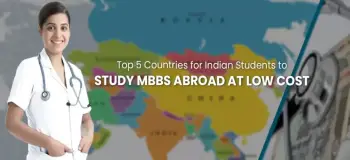
Studying MBBS abroad at a lower cost is a consideration for many Indian students. However, it's crucial to ensure that the chosen institution is recognized by relevant medical councils and provides a quality education. Here are five countries and ten advantages of studying medicine that have been popular choices for Indian students to pursue MBBS at a relatively lower cost:
"MBBS" stands for "Bachelor of Medicine, Bachelor of Surgery," and it's a professional undergraduate degree awarded to students who have completed the necessary training in the field of medicine and surgery. The term "MBBS" is used in many countries, particularly those with a British influence on their education systems.
Studying medicine is a rigorous and demanding endeavour, but it offers numerous advantages. Here are ten key benefits of pursuing a medical education:
It's important to note that while the advantages of studying MBBS abroad are significant, the journey is demanding and requires a strong commitment of time and effort. Additionally, ethical considerations, empathy, and a genuine desire to help others are crucial attributes for success in the medical field.
There has been a noticeable trend of Indian students pursuing medical education abroad. However, specific statistics regarding the percentage of Indian students studying medicine abroad can be challenging to pinpoint due to several factors. Data regarding the number and percentage of Indian students studying medicine abroad may change annually, and obtaining real-time statistics can be challenging. Indian students often choose various countries for medical education, including Russia, Ukraine, China, the Philippines, Kyrgyzstan, and others. The distribution across these countries can vary. Each destination country may have its own reporting systems, and obtaining a consolidated and accurate figure for the total percentage of Indian students studying medicine abroad can be complex. It's important for students to exercise caution and thoroughly research any institution before deciding to pursue MBBS abroad. Consider factors such as recognition by medical councils, language of instruction, reputation, facilities, and the overall quality of education. Additionally, be aware of visa regulations, accommodation options, and post-graduation opportunities in the chosen country.
Before making any decisions, it's advisable for students to consult with educational advisors, and, if possible, connect with alumni who have studied in the chosen country to gain insights into their experiences. Lastly, ensure that the medical degree obtained abroad is recognized in India and meets the necessary criteria for practice.
Related Tags
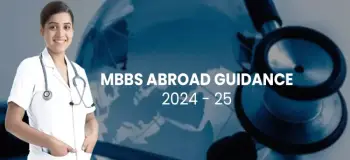
Studying MBBS abroad is a dream for many international students. You might be one of them with a long-cherished dream of becoming a doctor. A medical career is beyond doubt, a rewarding, exciting as well and challenging endeavor.
The demand for high-standard medical education and clinical training, cost of education, recognized degree, job prospects, and so forth are the concerns when you plan to study MBBS abroad.
It can be said without any shred of doubt that a large number of aspiring medical professionals explore opportunities beyond their home countries. Keeping in mind the fact we have prepared a guide for 2024-2025 to illuminate the way for those aspirants who like to study medicine abroad, say MBBS in Russia, Kazakhstan, Kyrgyzstan, Georgia, Nepal, Bangladesh, etc.
We are quite sure that this handy guide will give you valuable insight into the upcoming admission process and also help you find the best country to study MBBS.
Understanding the global landscape is one of the most important things when you plan to study MBBS abroad. This will help you study abroad in different ways.
Before diving into the specifics of medical admissions abroad for example many students want to study medicine abroad and choose MBBS in Kazakhstan, Georgia or Kyrgyzstan, therefore, it is important to know the global landscape of medical education.
Needless to say, MBBS in Georgia, Kazakhstan, Kyrgyzstan Russia, etc. have emerged as popular countries for international students seeking admission to medical programs because of affordable and high-quality medical education.
This is the reason you should research the medical curriculum, infrastructure, career opportunities, further education, scope to practise after completing MBBS, language of instruction, and cultural aspects of each country, say you are considering to study MBBS in Kyrgyzstan. It will not only help you make an informed decision, but also help you get the best medical school in that particular country.
Seeing approval and recognition is one of the foremost considerations when you choose a foreign medical school. Assuming you are from India and planning to study MBBS in Bangladesh then you need to see if the college you chose is approved and recognized by NMC and WHO or not.
Ensure that the medical college and the MBBS program you opt for are approved and recognized by international medical bodies such as the World Health Organization (WHO) and the Medical Council of your home country, as we said before if you are from Indian then the Medical Council of India, which is presently known as National Medical Commission. This not only ensures that your medical degree from MBBS abroad is globally accepted, but also facilitates smooth transitions during licensure and practice in your home country or anywhere in the world.
Each medical university in a foreign medical school, for example, MBBS in Russia or Kyrgyzstan may have distinct admission requirements. You should know the process for admission, duration, fees, and other important things before you move to that particular country.
The tenure of the program can also be different, for example, in Russia, the MBBS program is of 6 years, including 1 year of clinical internship. Whereas if you do MBBS in Kazakhstan; it is 5 years including 1 year of clinical internship.
It is, therefore, imperative to meticulously review and also understand these prerequisites, the process of admission along the duration of the program. You also need to understand the common criteria such as academic qualifications, and language proficiency, if required, though that is not required for studying MBBS in Georgia, Russia, Kazakhstan, Kyrgyzstan, Bangladesh, Nepal, Philippines, etc. You need to be well-prepared and plan accordingly to meet these requirements within the given time.
The entrance exam is mandatory one for many countries for MBBS admission, for example India, where NEET is a mandatory exam to study MBBS in Kyrgyzstan, Russia, Georgia, Kazakhstan, or Bangladesh. If you are coming from India and want to study MBBS in an NMC and WHO-approved medical school then having a valid NEET score is required.
On the other hand, in India, NEET is mandatory if you want to study MBBS in either a government medical school or a private medical school. Though private medical schools in India charge exorbitantly high tuition fees, which is why, a large number of candidates are moving to study MBBS in Bangladesh, Russia, Kazakhstan, Kyrgyzstan, and many other countries.
Now today, the NEET i.e. National Eligibility cum Entrance Test is a prerequisite for Indian students who are aspiring to pursue MBBS abroad. So, you should familiarise yourself with the particular exams required for your chosen destination, if any exam required, and invest time in comprehensive preparation.
Studying MBBS abroad involves financial planning. So, you should know first which medical school abroad is charging what medical fees exactly. You can compare the standard of education, recognition, exposure, etc. along with the feesf so that you can choose the best country to study MBBS.
In addition to that, you need to explore the opportunities for part-time work during your studies, if applicable or available to minimize the financial burdens. Therefore, understanding the cost of living, food and accommodation in the chosen country is crucial for effective budgeting for studying MBBS abroad.
Moving to a new country, like Russia, Georgia, Kazakhstan or Kyrgyzstan etc. entails cultural adaptation. Considering factors, such as lifestyle, climate, people, and societal norms are important when choosing a destination to study for MBBS. Therefore, familiarising yourself with the local food, people, culture and events not only eases the transition of your stay there but also enhances your overall experience as a student abroad.
A reliable and strong support system is important for international students studying MBBS abroad. Look for medical colleges that offer comprehensive student support services, including academic support, like counselling, language assistance, and accommodation, etc. When you can access these student support services, it can significantly contribute to your academic success and day-to-day well-being.
A VISA is one of the most crucial things that you need to understand first, and for that matter, an MBBS abroad Consultant can be a great help. You might not know which VISA and which VISA category is an application for studying abroad; they can help you with that. This will help your entire application process be smooth and hassle-free. They will also help you with the specific requirements during the application, documentation, and timelines associated with your visas.
Studying medicine in one of the top medical schools abroad is a life-changing decision that needs careful consideration, and we hope this handy guide will help as your study guide for medical science abroad, therefore, providing valuable insights into the 2024-25 MBBS admissions process.
Related Tags
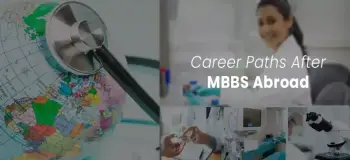
Studying MBBS Abroad is the most sought-after these days for several different reasons. Apart from high standard medical education, clinical training and international exposure, studying medicine Abroad holds more value when you compare it to doing the same studies in India or in your home country. A rough estimate will make you amazed as to why studying medicine Abroad is a greater choice than before. We are taking Russia as an example for studying MBBS.
You will also be amazed to know that more than 50k international students, from Asia, CIS countries, the Middle East and Africa study MBBS in Russia every year, and the number is growing by leaps and bounds.
Medical schools Abroad are all QS-ranked and offer high standard education at affordable costs and their standard of medical education is relatively higher when compared to India. Most countries invest a huge subsidy on their medical education for domestic and international students.
Finding your desired medical programs including MBBS at one of the top Universities Abroad, for example, Russia, Kazakhstan or Kyrgyzstan is easy. You just need to visit their website or get in touch with a trusted MBBS Abroad consultant who can help you choose the best medical school and country Abroad.
The career path after MBBS is diverse. You can work in various clinical settings, including hospitals, nursing homes, private clinics and even work as an independent medical practitioner. Let’s have a look at the diverse career paths after completing MBBS from one of the top medical schools in the world.
Medicine is a dynamic field. After completing MBBS Abroad, you can also pursue a PG in any specialisation of your choice and interest. There are huge research opportunities there after completing a PG in medicine. You will be able to work as an independent specialist doctor or can work as a specialist in a registered clinical setting. Working as an entrepreneur is also great. These days, many doctors are opening nursing homes or multi-speciality hospitals after completing their PG and gaining some experience.
There are many MBBS graduates from foreign countries from India working as civil servants for the state or federal government in various medical and administrative roles. So the choice is up to you, which one you choose or life as per your career objectives.
Studying MBBS Abroad is now super easy. You might be thinking that medical education Abroad is super expensive. Students suffer there. There might be no good job opportunities if you like to stay over there after completing MBBS, the visa process is so hectic, and they might be lost in loneliness. And, if you believe all these, you are missing out on some great things.
It's time to take you through the reality that can change. The reality is that you get exposure to varied cultures, expert guidance from universities, valuable career options, immense scholarship opportunities, and even the opportunity to learn new skills and languages every day.
Break free from all the assumptions and get to know the reality with Education Vibes, your trusted partner to Study MBBS Abroad.
If you are an MBBS aspirant and thinking about what to do next, then grab this valuable opportunity and experts from Education Vibes today! We will guide you towards greater achievements.
You will get one-to-one guidance throughout the entire process.
Related Tags

Medical education faces many challenges in keeping pace with the rapidly changing global healthcare needs. Traditional medical curricula, inadequate or lack of funding, weak quality assurance, and local accreditation practices contribute to the production of low-skilled physicians. This is happening all across the globe.
If we can’t properly merge healthcare with sustainable development, it wouldn’t be worthwhile for the common masses. To effectively address the healthcare issues of the 21st century, there is a crying need for new, effective, and efficient medical education, be it country-specific or MBBS Abroad. Here are some of the challenges faced that we need to modify.
In medical education, curriculum development is one of the most important things to have. For MBBS universities, the medical curriculum needs to be updated regularly, so that students can get up-to-date information on all medical domains. It plays a pivotal role in developing evidence-based curricula. The challenge is to incorporate new technologies, and facilities, like labs, libraries, dissection rooms, etc. are important. Universities must take a proactive role in bringing about the necessary changes in MBBS education.
Apart from evidence-based curricula, medical education should be recognised globally. The universities offering medical programs should be approved and accredited by international medical authorities and should updated regularly. Some renowned medical authorities, such as NMC, WHO, and FAIMER always provide updated information to make the medical curricula international standard.
The dependable healthcare system not only provides healthcare goods but also provides services to the population in different forms of healthcare products. A healthcare service or product might depend on its purposes. It targets various needs as considered to be preventive, treatable, diagnostic, and/or curative. Lack of resources can’t meet the demand of the masses; therefore, resource utilization is important.
Progress in various diagnostics or therapeutic applications and the use of modern technologies as well as tools combined help get longer life expectancy. To get these, one needs to have resources and their use. Many students who plan to study MBBS abroad for not get the proper facilities or resources that are needed in private medical schools in their home country.
The feminization of the medical profession is one of the most important things that can be considered a challenge in medical education. It is no doubt a worldwide phenomenon. Certified experienced women medical personnel not only play a key role in the whole spectrum of healthcare services but also share a large role in medical education. Therefore, it depends on a country’s average number of students participating in medical education. The ratio is increasing day by day for sure. This rising trend also challenges the system of healthcare organizations to play a core role. It offers various opportunities to adapt to the particular needs of female medical practitioners and to take advantage of their increasingly important role.
There is a huge shortage of qualified doctors the world over. This has been an international issue for years. This has met essential criteria for crisis all the time. A report has been published by WHO (World Health Organization) about the global shortage of almost 4.3 million doctors and nurses, as well as other healthcare professionals. This global issue not only generates a threat to the quality but also the sustainability of health education and systems worldwide. Foreign medical universities have taken an important role in this issue, where medical aspirants from all over the world are studying MBBS returning to their home country, and practicing over there.
A non-linear process sometimes refers to a threat as one that doesn’t progress or develop smoothly from one level to another in a logical way. Many believe a lot of students are moving to Study MBBS abroad, and this can be called a non-linear threat because brains are draining. The good thing is – when medical aspirants are not getting the opportunity to study medicine in their home country and when private medical schools in many countries charge exorbitantly high tuition fees, then studying medicine abroad can be a good choice. This way, a country can face the challenges towards sustainable development and minimize the shortage of doctors.
Due to inadequate administrative processes, many healthcare systems still need to meet the demands of the masses. This is especially true for a large country like India, China, or Russia. When the administration process increases properly the challenges can be overcome and ensure sustainable healthcare development. The process involves each level of management, combined with self-management decision-making. Both private and public hospitals need to increase the adequacy of their administration to smoothly function their healthcare system.
There are many challenges to sustainable healthcare in medical education. The healthcare sectors play an essential role in a country’s economy if it is an underdeveloped, developing, or developed country. The change in demographic patterns, inadequacy of resources, costs, feminization of medicine, a huge shortage of qualified physicians, good quality of medical training, research, and development, as well as affordable and satisfactory social well-being of personnel.
To manage all these things, these days, many medical aspirants are moving to Study MBBS abroad. They are looking for quality education where medical facilities and resources are there, cost is minimal, and a lot more. This helps not only, increase administrative processes, but also creates serious challenges that need to be addressed to provide a sustainable future of healthcare and medical education.
Related Tags
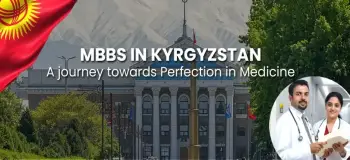
Kyrgyzstan is undoubtedly one of the best destinations for MBBS abroad. The first and major aspect is medical universities in Kyrgyzstan where you go study and get a degree that is globally accepted. Affordability is another important factor in choosing Kyrgyzstan for MBBS as the tuition fees are really very low in comparison to other countries and India itself. This is why Kyrgyzstan is not only the first choice for Indian students but also for other foreign students as well. This informative blog about MBBS in Kyrgyzstan will help you to know more about it and facilitate your decision to study MBBS abroad.
There are several reasons to choose Kyrgyzstan for MBBS and for Indian students it is best as the universities there are approved by NMC and WHO. This opens the door to opportunities to work as a doctor in India. To pursue an MBBS in Kyrgyzstan, applicants must receive at least 50% in their 10+2 exam results. There are other advantages for medical students as well, such as the friendly environment and experienced faculty. In Kyrgyzstan, students need to undergo one year of internship training in addition to five years of classroom teaching to pass the course. The MBBS program has a total duration of six years. But in Kyrgyzstan, in order to pursue an MBBS, one must also be eligible for the NEET.
Reasonably priced tuition: The majority of universities in Kyrgyzstan charge cheap tuition, which is a major draw for MBBS students. Students will obtain a high-quality education at a reasonable cost. In Kyrgyzstan, MBBS is a reasonably priced medical program.
Internationally renowned university: Kyrgyzstan's medical schools, which accept Indian students, are accredited and affiliated with numerous international organizations. Most Kyrgyz medical universities provide exposure to foreign countries, enabling graduates to pursue postgraduate study in any country.
No Donation or Extra Fees: Throughout your medical studies in Kyrgyzstan, none of the medical colleges require donations. During your enrollment, there won't be any undisclosed fees or tuition increases from the college (but this could change in the future). Kyrgyzstan for MBBS follows the policy of fairness and honesty.
Option for specialty: Following their undergraduate studies, medical graduates from Kyrgyzstan's medical universities are presented with a plethora of alternatives for their post-graduation specialty courses.
Technically Aimed Studies: In Kyrgyz medical colleges, teaching focuses on both theoretical and practical knowledge. A large number of Kyrgyz universities are equipped with advanced study tools, such as anatomical tables.
Thus MBBS from Kyrgyzstan is beneficial and it is home to good medical universities some of them are given below.
Kyrgyz universities stand out from the rest of the destinations for MBBS because hundreds of students enroll every year to seek higher education in medicine because they provide considerable clinical knowledge and real-world case studies. With over ten of the nation's most renowned and respected medical institutes, Kyrgyzstan offers affordable and sensible medical education, making MBBS in Kyrgyzstan for Indian students an excellent option for Indian students.
Each year, more than 4500 medical students are admitted to the International School of Medicine, Bishkek. This medical university in Kyrgyzstan opened in 2003. The three campuses of the International School of Medicine, Bishkek are renowned for their high standards of academic performance.
A medical university was established in 1993 in Jalalabad, called Jalalabad State Medical University. Jalalabad State Medical University is one of the medical institutions in Kyrgyzstan that is well-known for developing and supporting leaders in improving the well-being of communities and the Kyrgyz people. Jalalabad State Medical University is recognized by three prominent councils: the International Medical Education Directory, the WHO, and the NMC.
Established in 2004, the Asian Medical Institute is situated in Kyrgyzstan. Asian Medical Institute has been approved by the World Health Organization (WHO) and the National Medical Commission (NMC), two worldwide famous councils. Asian Medical Institute is well known for being one of the best medical schools in Kyrgyzstan.
The Kyrgyz Russian Slavic University is one of the most prestigious and elite medical schools in Kyrgyzstan. Founded in 1993, the Kyrgyz Russian Slavic University is located in Bishkek, Kyrgyzstan. Three fields of study and 45 specializations are offered by the Kyrgyz Russian Slavic University.
MBBS in Kyrgyzstan is very affordable and is also known for its remarkable and excellent education. The average MBBS tuition fee for MBBS in Kyrgyzstan in rupees is around 3,00,000 INR to 5,00,000 INR only. Below is the university-specific MBBS fee structure for Kyrgyzstan.
|
Name of the Universities |
Tuition Fees / Year (Rs.) |
Hostel Fees / Year (Rs.) |
|
Rs. 5,56,000 |
Rs. 56,000 |
|
|
Jalalabad State Medical University |
Rs. 2,25,000 |
Rs. 49,000 |
|
Asian Medical Institute |
Rs. 2,80,000 |
Rs. 56,000 |
|
Kyrgyz Russian Slavic University |
Rs. 3,64,000 |
Rs. 84,800 |
|
Rs. 2,45,000 |
Rs. 58,800 |
from quality medical education to affordable fees. From NMC recognition to job opportunities, it is Kyrgyzstan for MBBS which is one of the most chosen destinations. There are a lot of Indian and foreign students attending Kyrgyz medical universities. This would be your life-changing moment and Education vibes help you to get MBBS abroad admission and assist you not only before the admission but also after it.
Related Tags
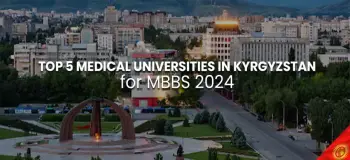
As a medical aspirant, it is your right to search for the best medical university to pursue an MBBS degree in Kyrgyzstan. Your career is a one-time investment in your future. Choosing a suitable college can help flourish your career. While selecting the best Kyrgyzstan Medical Colleges, you must consult an expert to make your future brighter and avoid mistakes.
Here we come, your guide to a fulfilling medical career. We can assist you in finding the most suitable university in Kyrgyzstan. Multiple medical universities allow international students to pursue MBBS in Kyrgyzstan. These are well-accredited and popular among Indian students. Let’s glance at some of them.
MBBS in Kyrgyzstan provides multiple benefits and is globally accepted. The universities of Kyrgyzstan are well-recognized and follow NMC guidelines published on 18th November 2021. These universities are NMC and WHO-approved. The universities are well-ranked and provide quality education in an affordable fee structure. The living cost in Kyrgyzstan medical college is low i.e., it is an opportunity for economically weak students.
|
Type of University |
Public (except Asian Medical Institute) |
|
Duration of Course |
6+1 year of Internship |
|
Medium of Instruction |
English Language |
|
Entrance Exam |
NEET(qualifying marks) |
|
Academics |
10+2 mark sheet (more than 50%) |
|
Accreditation |
NMC and WHO Approved |
Founded in 1939, Kyrgyz State Medical Academy (KSMA) is a public medical institution well-known for its quality education and vibrant teaching techniques. The university has many years of experience in providing medical education to Indian and international students. Students gladly choose KSMA as it meets the NMC standards and provides relevant education to students.
It is one of the oldest and most prestegious Medical colleges in Kyrgyzstan that gained multiple accreditations from medical authorties like NMC, WHO, FAIMER, IMED, etc, making it valid globally, and students can practice medicine worldwide. It's a safe environment, multicultural campus, and a simplified admission process make it a preferred choice for Indian students.
|
Type of Expenses |
Annual Cost in USD |
Annual Cost in INR |
|
Tuition Fee |
4800 |
3,98,400 |
|
Hostel Fee |
650 |
53,950 |
|
Mess & Food |
1500 |
1,24,500 |
|
Medical Insurance |
100 |
8,300 |
Jalal-Abad State Medical University (JASMU) is one of the well-reputed Medical colleges in Kyrgyzstan, offers an affordable MBBS program to students with English teaching. The course duration provided by JASMU is 6 years long, including 1 year of clinical training in top hospitals. The university provides modern infrastructure, well-equipped laboratories to students, and also provides Indian food options.
It provides a fluent environment to students for their learning. When we talk about the curriculum, it is designed to meet international medical standards that help students to qualify the examinations like FMGE and NExT. Its low tuition fees, quality education, make it ideal for Indian students.
|
Type of Expenses |
Annual Cost in USD |
Annual Cost in INR |
|
Tuition Fee |
4200 |
3,48,600 |
|
Hostel Fee |
600 |
49,800 |
|
Mess & Food |
1000 |
83,000 |
|
Medical Insurance |
100 |
8,300 |
Founded in 2003, International School of Medicine (ISM) is a NMC-approved medical university in Kyrgyzstan. It is a private university situated in Bishkek, Kyrgyzstan. It is one of the reputed Medical Colleges in Kyrgyzstan and is recognized by many bodies such as WHO, WFME, ECFMG, FAIMER, and MCC.
The total enrollment in ISM is over 4,500 students, and it is increasing every year because of the vibrant facilities provided by the faculty staff. The university claims to have an acceptance rate between 50 to 59%, and yet the university receives a large number of applicants each year, and only a few can enroll. It is also affordable to study in ISM.
|
Type of Expenses |
Annual Cost in USD |
Annual Cost in INR |
|
Tuition Fee |
4000 |
3,32,000 |
|
Hostel Fee |
650 |
53,950 |
|
Mess & Food |
1500 |
1,24,500 |
|
Medical Insurance |
100 |
8,300 |
Founded in 2004, Asian Medical Institute is a private medical college that offers an affordable medical education to students. The university provides a 5+1 years of MBBS program including 1 year of clinical exposure. It is counted as one of the best Kyrgyzstan Medical Colleges and has gained recognitions from NMC and WHO. The university provides several benefits to students, including affordable education, better ROI (Return On Investment), fair infrastructure, 12 months of clinical internship from a recognized clinic, easy admission process, and many more. ASMI will be a better option for your medical journey.
|
Type of Expenses |
Annual Cost in USD |
Annual Cost in INR |
|
Tuition Fee |
3500 |
2,90,500 |
|
Hostel Fee |
500 |
41,500 |
|
Mess & Food |
1200 |
99,600 |
|
Medical Insurance |
100 |
8,300 |
Founded in 1951, Osh State Medical University is one of the prestigious universities in Osh, the second-largest city in Kyrgyzstan. It is one of the selected government medical universities that was originally founded in 1939 as a teacher training institute by the Kirghiz SSR. The university is also accredited by multiple medical authorities such as the WHO (World Health Organization) and the NMC (National Medical Commission) thus being accepted in India. In this blog, we will discuss all the pieces of information about Osh University for Indian students.
|
Type of Expenses |
Annual Cost in USD |
Annual Cost in INR |
|
Tuition Fee |
4000 |
3,32,000 |
|
Hostel Fee |
600 |
49,800 |
|
Mess & Food |
1000 |
83,000 |
|
Medical Insurance |
100 |
8,300 |
Medical education in Kyrgyzstan is a facilitating opportunity for students to pursue their dream education, it possesses simple eligibility criteria compared to India. Kyrgyzstan universities follow a direct admission process without any donation requirements. Some of the well-established and recognized Medical colleges in Kyrgyzstan include Kyrgyz State Medical Academy, Jalal Abad State Medical University, International School of Medicine, Asian Medical Institute, and Osh State University. These universities are well-acknowledged by the WHO and NMC, thus accepted in India and globally.
Ready to pursue your medical dreams at the Kyrgyzstan Medical Universities? Book your free 1:1 counseling session now to explore admission opportunities and secure your seat. Start your MBBS Abroad Journey today with Education Vibes.
Related Tags
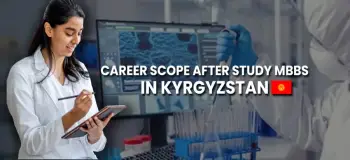
Studying abroad is a keen insight into lightweight formalities and excellence in career perspectives. India is equally enriching for candidates with a great amount of talent however the limitation of seats urges aspirants to move abroad. Pursuing medicine abroad can be a lifesaver for so many candidates whose dreams have lost track. Paramedics is one field of interest where patients and precision drive aspirants to new openings.
An MBBS in Kyrgyzstan for Indian Students however can be enriching and super beneficial. Affordability and reliability are important aspects of studying in the nation. Kyrgyzstan has become the medicinal hub for candidates to imbibe great exposure to medicinal careers and channel their inner dragon.
Kyrgyzstan is a wonderful place for finding the last resort for candidates. Delving into deep basics and an incredible study program we shall now have a glance at the merits of studying in Kyrgyzstan.
The prominent advantages of studying in the nation and experiencing a wonderful transition of culture and educational volume help to understand the points below.
After accomplishing an illuminating career abroad in Kyrgyzstan students can undergo far-reaching career possibilities which are mentioned below.
Following below is a very systematic study of different colleges which provides a keen insight into the fee structure and cost slab. Kyrgyzstan has a wonderful cost management incentive that helps students embark on an incredible journey for financial management in a wise manner. Accommodation and food costs are shared amicably.
|
Name of college |
Tuition Fees |
Hostel fees |
Mess Fee |
|
Kyrgyz State Medical Academy |
2419200 INR |
650 USD |
1500 USD |
|
International School of Medicine |
2016000 INR |
650 USD |
1500 USD |
|
Osh State Medical University |
2016000 INR |
500 USD |
1500 USD |
|
Asian Medical Institute |
1764000 INR |
500 USD |
1200 USD |
|
Jalal Abad State Medical University |
2268000 INR |
1000 USD |
1200 USD |
Eligibility Criteria which are required to be followed for attaining admission to medical institutions in Kyrgyzstan are cited below.
The very streamlined admission procedure to be followed by candidates is listed below.
The list of charters is mentioned below which need to be attested for the admission process.
The overall course structure for studying medicine in Kyrgyzstan is designed in a very cognitive way which helps students understand the disciplines and principles of paramedics. The course is designed in two stages namely clinical and pre-clinical. The pre-clinical stage involves the former 3 years. The clinical stage includes the latter three years which help in functioning students with proper knowledge and training in hospitals for practical experience.
An MBBS in Kyrgyzstan for Indian Students is an incredible journey met with ample advantages and quality in lifestyle. Having to engage in this beautiful program of medicine and healthcare regime, candidates are open to receiving the best knowledge with self-reliance and affordability.
Related Tags
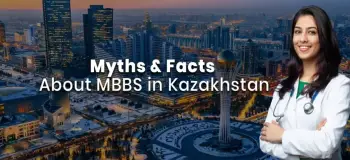
MBBS Abroad put forward multiple options like Russia, Georgia, Kazakhstan, and Egypt are the major destinations preferred among Indian students concerning their requirements. However, before choosing the appropriate destination and universities, students undergo various myths. Today, we will discuss major myth and their facts about MBBS in Kazakhstan. It will help you to make decisions and choose the most suitable destination and universities to complete your MBBS education in Kazakhstan.
Fact: No, the MBBS fees in Kazakhstan are much more affordable in comparison with Indian private medical colleges. It allows economically restricted students to gain better knowledge and facilities at a cost-effective MBBS fee structure. The MBBS fees in Kazakhstan approximation for different types of expenses are given below.
|
University Name |
Ranking |
Founded |
Annual Tuition Fee (in $) |
|
1 |
1934 |
4900 |
|
|
Kazakh National Medical University |
5 |
1930 |
6400 |
|
14 |
1964 |
5300 |
|
|
South Kazakhstan Medical Academy |
18 |
1979 |
4400 |
|
26 |
1992 |
4500 |
|
|
International Medical School(UIB) |
34 |
1992 |
3900 |
|
Kokshetau State University |
41 |
1962 |
3800 |
Fact: Kazakhstan is an economically stable country that consists of various public and private medical universities offering better knowledge and affordability to medical aspirants. There are various advantages of studying MBBS in Kazakhstan and one of them is the availability of more options with an enhanced acceptance rate.
Some of the major universities of Kazakhstan are given below.
Fact: No, students do not have to face any challenges related to language. As per NMC guidelines, all the recognized and NMC-approved medical colleges offer MBBS education in Kazakhstan.
Fact: It is important to gain high rankings in the NEET exam to get admission in India but is not the same for the MBBS in Kazakhstan admission. The students are not required to gain higher marks in the NEET exam. They are just required to get a passing score in the entrance exam to secure their seat in the Kazakhstan college.
Fact: No, it is not difficult to get the admission in Kazakhstan. It possesses an easy Admission process in MBBS Kazakhstan that does not require any donation charges or reservation criteria. It allows students to get admission to the university on the basis of “first come, first served”. The eligibility criteria are more simplified compared to India.
Fact: The MBBS degree from Kazakhstan is a valid option. Most of the Kazakhstan medical colleges follow NMC guidelines and are accredited by global medical authorities like WHO, UNESCO, ECFMG, WFME, etc. The MBBS degree in Kazakhstan is valid, if the students are pursuing an MBBS at an NMC-approved medical college by following all the NMC guidelines mentioned in 2021.
Fact: No, it is not too difficult to qualify for the exam, if you have spent 6 years of MBBS course duration in Kazakhstan because the MBBS curriculum of Kazakhstan follows the similar 19 major subjects mentioned in the NMC guidelines. It allows students to gain a similar education and knowledge approach at an affordable MBBS fee structure.
Fact: No, there is no specified MBBS scholarship in Kazakhstan. Indian students can get education loans and financial aid if they are lacking to submit the MBBS fees. However, the MBBS fee structure in Kazakhstan is much compatible and much lower than India’s private medical college.
Fact: Being an international student, it is hard to adapt to an international country to pursue an MBBS in Kazakhstan. Sometimes, international students take time to get comfortable with Indian students but it is a fact that Indian students get respect and attention in foreign countries due to their popularity and customs.
Fact: No, pursuing an MBBS in Kazakhstan without an NEET exam is not a healthy and beneficial decision. The students can face a lack of validity as disadvantage of studying MBBS in Kazakhstan if they pursue MBBS without NEET. Students must consider NEET as the primary requirement to study MBBS in Kazakhstan. It is mandatory to qualify for the NEET exam as per NMC guidelines.
We have discussed the top 10 myths and facts, students often undergo and misguided before pursuing an MBBS in Kazakhstan. It is important to get accurate and relevant information about any of your future career aspects. Today, we have clarified major myths that make students step back from applying to MBBS admission in Kazakhstan. Get more insightful information from Education Vibes to make the right decision to flourish your career either in Abroad or India.
Related Tags
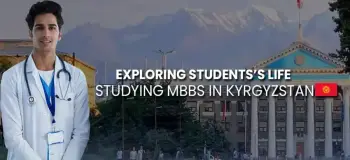
These days, the increasing popularity of MBBS abroad has made students choose the best and most suitable destination. Kyrgyzstan is the most reliable and acknowledged medical destination among Indian students. It allows them to gain better knowledge and accreditation with affordability. Students studying for an MBBS in Kyrgyzstan allow Indian students to get better opportunities and exposure at an affordable range of expenses. It allows medical aspirants to attain better knowledge and lifestyle. They can attain various opportunities and advantages of studying for an MBBS at top medical universities in Kyrgyzstan. Let’s explore the student’s life of Indian students studying at Kyrgyzstan medical colleges.
The Indian medical students studying for an MBBS in Kyrgyzstan can gain various advantages. Let’s discuss the student's life while pursuing an MBBS at a top medical college.
Now, we will see the top medical universities in Kyrgyzstan that offer valid education and all of the mentioned advantages to pursue an MBBS in Kyrgyzstan.
|
University Name |
Ranking in Country |
Annual Tuition Fees(USD) |
|
Kyrgyz State Medical Academy (KSMA) |
3 |
4800 |
|
Asian Medical Institute |
31 |
3500 |
|
International Higher School of Medicine |
22 |
6000 |
|
23 |
4000-6000 |
|
|
Kyrgyz Russian Slavic University |
2 |
4000 |
These universities are publicly held which allows medical aspirants to gain better knowledge and opportunities. It allows medical aspirants to gain international exposure along with an enhanced educational approach.
The Indian medical aspirants studying for an MBBS in Kyrgyzstan explore the most advantageous and healthy lifestyle abroad. They get international education, face different challenges, explore new cuisines, and all of them at affordable MBBS fee structures. They must gain better knowledge and affordability. The students are required to spend a limited amount to gain better knowledge and experience. Students can gain enhanced opportunities and affordability.
Related Tags
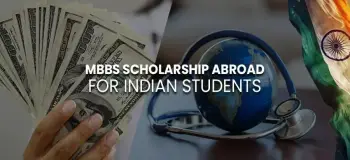
Uncovering to study MBBS abroad scholarship requires deep research and reliable information. It allows Indian students to acquire better knowledge and career opportunities at an affordable cost. The cost of studying MBBS abroad is much more affordable than that of Indian medical universities. The annual tuition fees for MBBS abroad start from less than 2 lakhs. The availability of scholarships at various destinations can be an amazing factor in choosing a suitable university. Students can find scholarships available according to their requirements. Today, we are mentioning the types and names of major scholarships offered to students.
These days, the availability of scholarships for MBBS students to study abroad has been a major concern among Indian students who want to pursue their medical studies Abroad. This allows students to attain better knowledge and opportunities at an affordable cost.
Let’s learn about scholarships abroad for MBBS students.
The government-funded scholarship for MBBS abroad is offered by the government at different eligibility levels. Majorly, this scholarship is offered in well-developed countries which consists of a high MBBS fee structure. Some of the major study MBBS abroad scholarship programs fall under government-funded are given below.
Privately funded scholarships are the private and independent approach to help international students get admission to their dream university with some rigid eligibilities. The students are allowed to possess better education and opportunities at an affordable MBBS fee structure. This facilitates Indian students with better study MBBS abroad scholarship. Its example can be scholarship particularly for women or for specific geographical areas.
The need-based scholarship is an opportunity for economically struggling students. This can be offered by the government or universities. It allows students to have financial assistance. The students are allowed to pursue their dream degree abroad at an affordable range.
This merit-based scholarship is the scholarship of excellence. It measures the excellence in the stream students want to pursue. This is based on their prior education, merits, academics, athletics, art, etc. This scholarship eligibility can vary depending on the course and university. It allows students to accomplish their dreams with the impressive study MBBS Abroad scholarship. The major scholarships are academic and sports scholarships.
This is the scholarship only facilitated by the university based on the student's course selection. It could be based on several factors like students’ scores, courses, and personal achievements.
These are the major type of scholarship that allows Indian students to pursue their dream degree at an acknowledged destination.
The study MBBS abroad scholarship for Indian students is very beneficial and some major scholarship programs to study Abroad are given below.
Studying for an MBBS in Russia with a scholarship can be beneficial for Indian students. Russia is already the most affordable country to pursue an MBBS which has a starting tuition fee of 180000 Rubles annually. Moreover, within 30 lakhs students can complete their MBBS Abroad from Russia. This is the reason why a major amount of students opt for MBBS in Russia without feeling the need of scholarships. For more information visit - Can I get a scholarship in Russia for MBBS?
Attaining the scholarship for MBBS in Georgia is an excellent opportunity. Georgia offers all types of scholarships for Indian students and some of the major universities also offer scholarships in Georgia. These Georgian universities are:
For more information about Georgian scholarships visit Scholarship for Georgian Medical Universities for Indian students
“How to get a scholarship for MBBS abroad?” is a highly demanding question on the internet that allows students to uncover the opportunities of getting a scholarship or ease of expenses. Follow the steps to get a study MBBS Abroad scholarship.
The students can gain better knowledge and opportunities at an affordable fee structure through MBBS Abroad opportunities. Attaining a scholarship for MBBS in Kyrgyzstan is not possible because getting scholarship chances is less over there. However, students can get scholarships to study in USA, UK, Germany, etc. However, the fees after a scholarship in the USA are more than the Russian fees without any scholarship. This is the reason why Indian students prefer studying abroad in Russia, Georgia, Kazakhstan, Kyrgyzstan, Egypt, Nepal, and Bangladesh.
Education Vibes is here to help students with all their concerns regarding fees and financial guidance.
Related Tags

As medical aspirants, students sometimes find it challenging to choose a suitable country for MBBS abroad. Multiple countries across the world allow students to have multiple beneficial opportunities and options to select from. These universities allow students to study MBBS in top medical universities. Compared to India, the fees of MBBS in Kyrgyzstan are quite fascinating. It comprises low living expenses and a fee structure. Kyrgyzstan is one of the most favourable destinations for MBBS Abroad allowing students to get a globally recognized MBBS degree in Kyrgyzstan within an affordable range. These universities are well-recognized and globally approved. There are multiple features and advantages of opting for MBBS at Kyrgyzstan’s universities.
Yes, Kyrgyzstan is one of the top destinations that enables students to gain better knowledge and opportunities. Bishkek is the capital of Kyrgyzstan, a landlocked country. Its currency is Kyrgyz Som which is equal to 0.95 Indian rupee. It consists of top medical universities that allow Indian students to accomplish their dream of getting a quality education. MBBS in Kyrgyzstan provides opportunities to thousands of international students to get a globally accepted medical degree. Every year almost 15,000 international students opt for MBBS at Kyrgyzstan Medical Colleges.
Yes, Kyrgyzstan offers a quite affordable and fascinating fee structure to Indian students. It is a financially stable country. It facilitates top-notch facilities and best education practices at an affordable which starts from 2 lakhs only annually. The universities allow Indian students to spend a minimum amount for the best educational approach.
There are various types of expenses some of them are fixed expenses and a few are variable. The students should make a financial budget plan before pursuing an MBBS in Kyrgyzstan.
MBBS in Kyrgyzstan Fees Structure is as follows.
|
Type of Expense |
Annual Cost in USD |
Annual Cost in INR |
|
Tuition Fees |
3500.00 |
303056.25 |
|
Living & Accommodation |
600.00 |
51952.50 |
|
Mess & Food |
1500.00 |
129881.25 |
|
Visa Fee |
200.00 |
17317.50 |
|
Medical Insurance |
100.00 |
8658.75 |
Detailing all these MBBS in Kyrgyzstan fee expenses linearly.
The Kyrgyzstan MBBS Fees are variable depending on universities and locations. Each university possesses a different fee structure which must be considered by students before applying to Kyrgyzstan universities.
The Kyrgyz State Medical Academy is a high-ranked medical university established in Kyrgyzstan. It allows Indian students to gain better knowledge and opportunities.
|
Type of Expense |
Annual Cost in USD |
Annual Cost in INR |
|
Tuition Fees |
4800.00 |
415620.00 |
|
Living & Accommodation |
650.00 |
56281.88 |
|
Mess & Food |
1500.00 |
129881.25 |
|
Visa Fee |
200.00 |
17317.50 |
|
Medical Insurance |
100.00 |
8658.75 |
The Asian Medical Institute is an excellent medical university that allows students to gain an excellent education and world-recognized degrees that allow students to attain excellent practical skills.
|
Type of Expense |
Annual Cost in USD |
Annual Cost in INR |
|
Tuition Fees |
3500.00 |
303056.25 |
|
Living & Accommodation |
500.00 |
43293.75 |
|
Mess & Food |
1200.00 |
103905.00 |
|
Visa Fee |
200.00 |
17317.50 |
|
Medical Insurance |
100.00 |
8658.75 |
The International School of Medicine facilitates world-class education from the top experienced faculties. It allows better education at an affordable range of expenses.
|
Type of Expense |
Annual Cost in USD |
Annual Cost in INR |
|
Tuition Fees |
4000.00 |
346350.00 |
|
Living & Accommodation |
650.00 |
56281.88 |
|
Mess & Food |
1500.00 |
129881.25 |
|
Visa Fee |
200.00 |
17317.50 |
|
Medical Insurance |
100.00 |
8658.75 |
The International Higher School of Medicine is an excellent medical education institute that allows students for acknowledge an MBBS degree which is reputed globally.
|
Type of Expense |
Annual Cost in USD |
Annual Cost in INR |
|
Tuition Fees |
6000.00 |
519525.00 |
|
Living & Accommodation |
500.00 |
43293.75 |
|
Mess & Food |
1500.00 |
129881.25 |
|
Visa Fee |
200.00 |
17317.50 |
|
Medical Insurance |
100.00 |
8658.75 |
Other than these universities,
This is the approximation of Kyrgyzstan fees for Indian students charged at different universities. Some of them are state-funded and some are private universities that allow students to study at high-ranked medical universities. It enables students to gain better knowledge and opportunities at an affordable fee structure.
MBBS in Kyrgyzstan has been one of the most popular choices among Indian students for several years. It consists of well-recognized top medical universities that allow students to get globally accepted MBBS degrees. It allows students to study at a low MBBS in Kyrgyzstan fee structure. It helps students to get quality education, excellent career prospects, well-experienced faculties, and better clinical practices within a fascinating range of expenses. Attain medical degree at fascinating MBBS in Kyrgyzstan fee structure.
Consult Education Vibes for better career opportunities in medicine career. We are dedicated to helping and supporting you on your MBBS Abroad journey.
Related Tags
Related Blogs
Top Bangladesh Medical Colleges: All You Need to Know
Do you want to make your career bright in medicine? MBBS in Bangladesh is an ideal option for many international students. Now, a majority of Indian medical aspirants are moving to Bangladesh to study medicine. Pursuing Bangladesh Medical Colleges for MBBS study has gained popularity among Indian students because the fees are really affordable. High-quality education, and a curriculum similar to Indian medical colleges, makes it more superior. The country has several reputed medical institutions that offer globally recognized degrees. This guide provides a detailed look at the best Bangladesh colleges for medicine, their admission requirements, and fee structures.
|
Degree Conferred |
MBBS (Bachelor of Medicine and Bachelor of Surgery) |
|
Eligibility |
50% in 10+2 with PCB for the general category 45% for the reserved (SC/ST) category NEET passing score is mandatory |
|
Duration for MBBS in Bangladesh |
5+1 Years 1 year of clinical training or rotation |
|
Medium of Teaching |
English |
|
Recognition of Bangladesh Medical College |
NMC, WHO, WFME, ECFMG, FAIMER, and MCC |
|
NEET Requirement |
Yes, required for Indian Students |
|
Annual Tuition Fees in USD |
5500-12000 |
|
Living Cost Per Month |
₹12,000 – ₹18,000 per month (including hostel & food) |
Dhaka National Medical College was founded in 1994, is affiliated with the University of Dhaka. It provides excellent clinical training through its well-equipped teaching hospital.
Bangladesh Medical College Fees Structure
|
Course |
Total Tuition Fees (USD) |
Total Tuition Fees (INR) |
|
MBBS |
48,000 |
41,80,800 |
Established in 2003, Enam Medical College is located in Savar, Dhaka. The college offers modern medical training facilities and excellent clinical exposure. It is one of the best Bangladesh Medical Colleges.
|
Course |
Total Tuition Fees (USD) |
Total Tuition Fees (INR) |
|
MBBS |
50,000 |
43,55,000 |
Situated in Sylhet, Jalalabad Ragib-Rabeya Medical College was founded in 1995. It is affiliated with Shahjalal University of Science and Technology and is known for its diverse student base. MBBS in Bangladesh is a great choice in this college.
|
Course |
Total Tuition Fees (USD) |
Total Tuition Fees (INR) |
|
MBBS |
43,950 |
38,28,045 |
Established in 2008 in Rangpur, Prime Medical College provides a structured MBBS curriculum and modern medical training facilities. The college is known for its academic excellence. It is very popular for MBBS in Bangladesh
|
Course |
Total Tuition Fees (USD) |
Total Tuition Fees (INR) |
|
MBBS |
42,000 |
36,58,200 |
Located in Gazipur, Tairunnessa Memorial Medical College was founded in 2002 and offers a well-rounded medical education with research opportunities. The college is affiliated with the University of Dhaka and recognized by the Bangladesh Medical & Dental Council (BMDC). This college comes under the top 20 colleges of Bangladesh as per the Bangladesh medical college ranking.
|
Course |
Total Tuition Fees (USD) |
Total Tuition Fees (INR) |
|
MBBS |
45,000 |
39,19,500 |
Established in 1998 in Sylhet, North East Medical College is affiliated with Shahjalal University and offers strong clinical exposure. MBBS in Bangladesh is an excellent decision in this college.
|
Course |
Total Tuition Fees (USD) |
Total Tuition Fees (INR) |
|
MBBS |
44,000 |
38,32,400 |
Established in 2013, President Abdul Hamid Medical College in Kishoreganj is gaining prominence due to its quality education and modern infrastructure. It offers a high standard of education, excellent faculty, and modern medical facilities. It is one of the top Bangladesh Medical Colleges
|
Course |
Total Tuition Fees (USD) |
Total Tuition Fees (INR) |
|
MBBS |
38,000 |
33,09,800 |
Dhaka Central International Medical College, founded in 2010, provides high-quality education with global exposure through its modern medical programs. This comes under the best Bangladesh Medical Colleges
|
Course |
Total Tuition Fees (USD) |
Total Tuition Fees (INR) |
|
MBBS |
43,200 |
37,62,720 |
Khulna City Medical College, established in 2010, is located in Khulna and offers excellent academic programs with a focus on practical learning.It is among the Top 40 in Bangladesh Medical Colleges.
|
Course |
Total Tuition Fees (USD) |
Total Tuition Fees (INR) |
|
MBBS |
40,000 |
34,84,000 |
Established in 2009, Diabetic Association Medical College specializes in medical research with a focus on diabetes care. Located in Faridpur, Bangladesh, the college is affiliated with the University of Dhaka and recognized by the Bangladesh Medical & Dental Council (BM&DC). It offers a comprehensive MBBS program and is dedicated to advancing medical education and research in diabetes
|
Course |
Total Tuition Fees (USD) |
Total Tuition Fees (INR) |
|
MBBS |
42,000 |
36,58,200 |
Located in Dhaka, Popular Medical College Hospital was established in 2010 and is well-known for providing excellent medical training. It is among the top medical colleges in Bangladesh, offering a five-year MBBS program affiliated with the University of Dhaka. The college boasts modern facilities, experienced faculty, and a commitment to producing competent medical professionals.
|
Course |
Total Tuition Fees (USD) |
Total Tuition Fees (INR) |
|
MBBS |
44,000 |
38,32,400 |
These top colleges are best for MBBS in Bangladesh for Indian students. They no doubt offer a quality MBBS education at a very affordable cost, making them an excellent option for Indian students.
Note: The exchange rate is considered as 1 USD = 87.10 INR
Pursuing MBBS in Bangladesh is no doubt an excellent option for Indian students looking for an affordable medical college which provides English-medium medical education. Bangladesh has established itself as a strong destination for MBBS education due to its affordability and high-quality curriculum. With multiple reputed institutions, Indian students can find a great alternative to private colleges in India. Carefully consider the rankings, facilities, and tuition fees when making a choice.
Let Education Vibes help you choose the best from Bangladesh Medical Colleges according to your goals, and help you get into the same for fulfilling your dreams.
Climate in Russia: A Guide for Indian Students
MBBS abroad is the most acknowledged and preferred destination among Indian students and allows for better options and career opportunities. Russia has caught the major attention from last 40 years that enable students to gain better knowledge and opportunities that enhances the student’s career. However, while choosing a destination for Abroad education, students prefer to analyze the destinations includes reading climate in India. This plays a major role in selecting a destination and university to study in Russia. Different cities in Russia face different climatic conditions at the same time. This enables students to stay healthy and study with complete dedication. In this blog, we’ll read about the different climatic conditions faced in multiple destinations in Russia.
In India, we have 4 major seasonal changes that ultimately affect the climate of India. Similarly, Russia's Climate is known for its vibrant and beautiful cold weather. Today, we will compare the climate in Russia according to four seasonal appearances. This enables students to analyze the different Russian climatic Conditions compared to the Indian climate.
In this blog, we will look at the different destinations of Russia facing different climates in Russia, enabling students to face different adapting challenges. Reading this section enables students to gain a better understanding and analysis of different opportunities and enhances the student's opportunities to gain enough knowledge of upcoming challenges.
|
Region |
Winter |
Spring |
Summer |
Autumn |
|
Moscow |
-10°C to -15°C |
0°C to 15°C |
15°C to 25°C |
0°C to 10°C |
|
Kazan |
-10°C to -20°C |
0°C to 15°C |
15°C to 25°C |
0°C to 10°C |
|
Perm |
-18°C to -25°C |
-5°C to -10°C |
10°C to 20°C |
-5°C to 5°C |
|
St. Petersburg |
-8°C to -12°C |
0°C to 15°C |
15°C to 25°C |
0°C to 10°C |
|
Baltic Sea |
-5°C to -10°C |
0°C to 15°C |
15°C to 25°C |
0°C to 10°C |
|
North Western Russia |
-10°C to -15°C |
0°C to 15°C |
15°C to 25°C |
0°C to 10°C |
|
Central Russia |
-15°C to -20°C |
-5°C to 10°C |
10°C to 20°C |
-5°C to 5°C |
|
Southern Russia |
0°C to 5°C |
10°C to 20°C |
20°C to 30°C |
5°C to 15°C |
|
Ural |
-20°C to -30°C |
-10°C to 0°C |
0°C to 15°C |
-10°C to 0°C |
|
Siberian |
-30°C to -40°C |
-20°C to -10°C |
-10°C to 0°C |
-20°C to -10°C |
|
Far Eastern Russia |
-20°C to -30°C |
-10°C to 0°C |
0°C to 15°C |
-10°C to 0°C |
Being a cold country, Russia's lowest temperature in winter can fall up to -30°C. Students can easily adapt to this climate in Russia and get the benefit of all the educational and career opportunities to gain excellence and opportunities.
In this blog, we have seen the different temperatures in Russia that enable students to get informed and make a valid and better decision before choosing the particular university to study MBBS in Russia. The climate in Russia is generally referred to as Cold, and students adapt to the Russian weather to grab their dream education and opportunities in career.
Education Vibes has written this informational blog to help students compare the Russian climate with India’s. This helps them to better understand and make informed decisions.
Top 10 Philippines Medical Colleges
Do you want to take your medical career global? MBBS in Philippines is the right choice for you. The Philippines has become a top destination for Indian students who want to pursue MBBS at very affordable tuition fees, English medium instruction, and want to get high-quality medical education for sure. This country has several top-ranked medical universities in the world, and the country definitely offers an excellent option for students who want to study MBBS abroad.
If you are considering an MBBS at a Philippines medical college, this blog will help you explore the best medical colleges in the Philippines, their admission process, and why they are a great choice for your bright future.
The University of Santo Tomas (UST) is surely the oldest Philippines medical university in Asia. It was established in 1611. It is known for world-class medical education and state-of-the-art research facilities, and it has affiliation with top-class hospitals.
|
University |
Ranking (Philippines) |
Foundation Year |
Annual Tuition Fees (INR) |
Annual Tuition Fees (USD) |
|
University of Santo Tomas (UST), Manila |
#1 |
1611 |
40-50 Lakh |
6,000-7000 |
Brokenshire College is one of the affordable and reputed private Philippines medical colleges. It provides high-quality education, practical-based learning, and excellent clinical exposure at affiliated hospitals.
|
University |
Ranking (Philippines) |
Foundation Year |
Annual Tuition Fees (INR) |
Annual Tuition Fees (USD) |
|
Brokenshire College, Davao |
#8 |
1954 |
20-25 Lakh |
3,500 - 4,500 |
Davao Medical School Foundation (DMSF) is without any doubt one of the top choices for Indian students for MBBS in Philippines medical college due to its high FMGE/NExT passing rate, modern labs, and strong clinical training programs.
|
University |
Ranking (Philippines) |
Foundation Year |
Annual Tuition Fees (INR) |
Annual Tuition Fees (USD) |
|
Davao Medical School, Davao |
#6 |
1976 |
22 - 28 Lakh |
4,000 - 5,000 |
The Manila Times College is among the best medical college in Philippines. This modern institution follows a US-based curriculum, making it an excellent choice for students aiming for USMLE and international practice.
|
University |
Ranking (Philippines) |
Foundation Year |
Annual Tuition Fees (INR) |
Annual Tuition Fees (USD) |
|
The Manila Times College, Manila |
#12 |
2002 |
18-22 Lakh |
3,500 - 4,500 |
AMA School of Medicine is a part of the AMA Education System, this medical college for MBBS in Philippines provides a cutting-edge curriculum emphasizing medical research and technology.
|
Name of University |
Ranking (Philippines) |
Foundation Year |
Annual Tuition Fees (INR) |
Annual Tuition Fees (USD) |
|
AMA School of Medicine, Manila |
#10 |
2008 |
20-25 Lakh |
3,800 - 4,800 |
The University of Perpetual Help System DALTA is a renowned private medical college in the Philippines, celebrated for its strong clinical partnerships and excellent student support services.
|
Philippines medical college |
Ranking (Philippines) |
Foundation Year |
Annual Tuition Fees (INR) |
Annual Tuition Fees (USD) |
|
University of Perpetual Help DALTA, Las Piñas |
#7 |
1975 |
25-30 Lakh |
4,500 - 5,500 |
Emilio Aguinaldo College is a highly reputed private medical college for MBBS in the Philippines, known for its strong international partnerships, excellent faculty, and research-based medical education.
|
University |
Ranking (Philippines) |
Foundation Year |
Annual Tuition Fees (INR) |
Annual Tuition Fees (USD) |
|
Emilio Aguinaldo College, Manila |
#9 |
1957 |
22-27 Lakh |
4,000 - 5,000 |
Our Lady of Fatima University is surely one of the most popular medical schools among Indian students. It offers a well-structured MBBS curriculum surely aligned with global medical standards. It is a good Philippines medical college.
|
University |
Ranking (Philippines) |
Foundation Year |
Annual Tuition Fees (INR) |
Annual Tuition Fees (USD) |
|
Our Lady of Fatima University, Valenzuela |
#5 |
1967 |
30-35 lakh |
5,000 - 6,000 |
UV Gullas College of Medicine is situated in Cebu is surely a popular choice for Indian students for MBBS in Philippines. It will offer you affordable tuition fees, excellent hostel facilities, and practical-based learning.
|
Name of University |
Ranking (Philippines) |
Foundation Year |
Annual Tuition Fees (INR) |
Annual Tuition Fees (USD) |
|
UV Gullas College of Medicine |
#11 |
1919 |
20-26 Lakh |
3,500 - 4,500 |
Cebu Institute of Medicine is a top-class medical college for MBBS in Philippines. CIM is also known for its high academic standards, strong research programs, and no doubt advanced labs.
|
University |
Ranking (Philippines) |
Foundation Year |
Annual Tuition Fees (INR) |
Annual Tuition Fees (USD) |
|
Cebu Institute of Medicine, Cebu |
#3 |
1957 |
30-35 Lakh |
5,500 - 6,500 |
These top medical colleges in the Philippines no doubt offer a quality MBBS education at a very affordable cost, making them an excellent option for Indian students.
Step 1: Check Eligibility
Step 2: Select a Medical College
Step 3: Application Process
Step 4: Receive Admission Letter
Step 5: Apply for a Student Visa
Step 6: Arrive in the Philippines & Start MBBS
Pursuing MBBS in Philippines is no doubt an excellent option for Indian students looking for an affordable medical college which provides English-medium medical education. With high-quality medical training, USMLE and FMGE preparation, and globally recognized degrees, the top medical colleges in the Philippines no doubt provide you excellent career opportunities at very reasonable prices. So which Philippines medical college do you prefer? Let Education Vibes know and help you get into the same for fulfilling your dreams.
Education Loan for MBBS in Abroad
These days, Indian aspirants are widely shifting for MBBS abroad. It has happened due to several causes, mainly the high competition in India. It allows simplified admission to the Indian students struggling in India to gain government medical seats. It allows students to enhance their educational approach and attain an excellent MBBS education at an affordable MBBS fee structure. The availability of education loans for MBBS Abroad allows financially struggling Indian students to gain their dream degree within an affordable range. Several countries like Russia, Georgia, Egypt, etc are a few renowned destinations for MBBS education that allow medical aspirants to get admission to the best medical colleges Abroad. Let’s uncover the top study loan opportunities for MBBS Abroad.
Yes, you can get the education loan for MBBS Abroad that enables students to attain excellence and success. This enables students to pursue the MBBS degree from abroad at an affordable range with the help of an education loan for MBBS.
The high cost of MBBS abroad in a few countries can be overcome with the help of a study loan for MBBS Abroad. This enables students to gain better knowledge and opportunities with a feasible fee structure.
There is a simple procedure to get the Education loan for MBBS Abroad. Students can apply for a loan with the steps given below.
The type of education loan for MBBS Abroad determines the various factors of loan facilities. This enables students to gain better financial opportunities.
Also, Uncover the facilities of Education loans for MBBS in Russia.
The loan amount for the MBBS Abroad education loan completely depends upon the lender, scheme, profile, course fees, and other factors. Typically lenders offer education loans for MBBS Abroad up to 20 lakhs to 50 lakhs. It can be more and increase the 100% of the course fees.
The international banks can offer up to 2 to 3 crore who want to pursue the course Abroad.
Here are the basic Eligibility criteria for the MBBS Abroad Education Loan Opportunity. Students are required to possess the documents needed for education loans showcasing these eligibility requirements to be fulfilled.
Age: The students must possess a minimum of eighteen years of age and some destinations have an upper age restriction of 25 years old.
Academic: The students are required to score well in their 10+2 mark sheet with a decent score in Physics, Chemistry, and Biology.
Admission: The students are required to show admission at foreign universities to attain education loan for MBBS abroad.
Co-Applicant: The students must have their parent or guardian to sign as a co-applicant on a consent form.
Here is the education loan documents list, that must be possessed by the students while applying for the education loan.
Also, Uncover the Georgian Scholarship Eligibilities and Opportunities for Indian students.
Education Loan for MBBS Abroad enables Indian students to gain better knowledge and opportunities that enable them to enhance their career approach within an affordable range. It facilitates financial help that enables students to attain excellence and make their dreams come true. We have mentioned the eligibility criteria, document requirements, types, percentages, and processes to get a loan. For detailed scholarship, education, and financial assistance, contact Education Vibes.
Are MBBS degrees from Bangladesh recognised in India?
Since the inception of medicine, Bangladesh has been a prominent destination for international students. Studying MBBS abroad is a dream of many students, if it’s your dream too, stay tuned. NMC has issued new guidelines and has strict rules for students who wish to aspire to study for an MBBS degree in Bangladesh. Therefore a question arises in the mind of candidates whether the degree is recognized and valid in India or not. Bangladesh is the first most choice of Indian medical aspirants and it is renowned for providing excellent quality Education. In this blog, we will learn this in detail and solve all your doubts related to studying medicine abroad.
Yes, the medical degree you receive from Bangladesh colleges and universities is recognized in India and other countries. So, yes, Bangladesh MBBS degree validity in India is a truth.
However, there are certain conditions for the same such as:
So, if you are confused about the validity of the degree provided by the Bangladesh universities, or think that is Bangladesh good for MBBS for Indian students, then, you needn’t worry as the medical degree provided is valid in many countries including India.
The eligibility criteria which need to be fulfilled for admission in Bangladesh are mentioned below.
Students who travel from various parts of the globe should know that Bangladesh is one of the most recognized places for building a bright future. According to the revised NMC guidelines for Bangladesh MBBS, which was called the Medical Council of India earlier, the Bangladesh MBBS degree is valid in India. All the aspirants who study in Bangladesh just need to qualify for the NEET exam for admission.
There are some of the best medical institutions in Bangladesh that offer the best MBBS program, very well known for reasonable fees, great quality education, and modern facilities. Medical colleges in this country are very well recognized by NMC which makes graduates eligible to take the FMGE exam to practice medicine in India.
Some of the well-known and MCI-approved Bangladesh medical colleges are:
Admission to the Indian students is quite hassle-free. Many universities have programs that are in English medium, and therefore they are assured that language will not be a barrier to getting an MBBS degree in Bangladesh.
The MBBS admission in Bangladesh procedure in Bangladesh is very easy and is meant to be followed by all internationals in a systematic format.
The documents that need to be enclosed for Bangladesh are mentioned below in a systematic order for students to follow.
The countries that fulfill the NMC rules for MBBS abroad are Russia, Kazakhstan, Kyrgyzstan, Georgia, and Egypt. Foreign MBBS graduates returning to India must clear the FMGE exam, complete another 12 months of internship in India, and obtain provisional registration before being eligible for permanent registration. In 2019, the NMC bill introduced the NEXT exam.
As per the latest NMC guidelines for MBBS abroad, the NEXT exam will replace the FMGE exam for obtaining a medical license in India. The NEXT exam is compulsory for both foreign medical graduates and Indian ones. The students who pass the first part of the exam are eligible for an internship.
The FMGE exam is a licensing exam for foreign medical graduates to certify that they are eligible to practice medicine in India. Applicants need to apply to the university directly and follow the guidelines accordingly to consider their credibility valid. An FMGE pass rate for Bangladesh graduates is 20.67%. Suppose the candidates are willing to study in Bangladesh. In that case, they need to reassure themselves of the accreditation of colleges by the NMC and WHO, which is mandatory for students to consider their degree program valid.
One more thing to note is After completing an MBBS degree in Bangladesh, candidates are supposed to pass the FMGE exam to practice medicine in India.
Studying in Bangladesh is a great option, and an MBBS degree in Bangladesh is valid and recognized in India as per the new NMC guidelines. Students just need to pass the NEET exam and then take admission to make the validity of their degree in India. With a variety of government and private colleges available, students are free to select an institution that surely aligns with their budget and preferences. Education Vibes is one of the best consultancy that helps students get admission to their favorite medical university abroad. Feel free to contact us!
